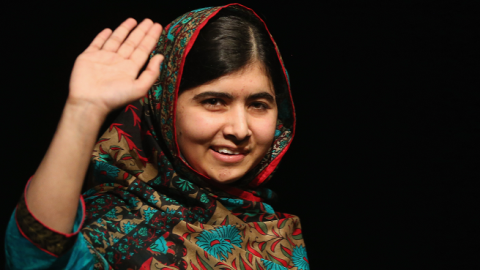Just about a year ago, the Western world held its collective breath, hoping against hope to hear that the courageous young Pakistani teenager, Malala Yousafzai, had won the Nobel Peace Prize.
A spokesperson for freedom, for education and the rights of women and girls, Malala emerged from one of the darkest places on Earth.
Malala has always stood in a class of her own.
At just 11-years-old, she became an international advocate of female education, writing her own blog and demanding schooling for girls in her Swat Valley community. In doing so, she faced off against the radical Islamist Taliban who had explicitly forbidden girls to read, write or think for themselves.
Then, on October 9, 2012, Malala was rewarded for her tireless efforts with a Taliban bullet to the forehead. For days, her life hung in the balance. She survived, thanks to a gifted British medical team.
Thankfully, against all odds, and despite physical challenges caused by her injury, she recovered and seemed to bounce back stronger than ever. The next thing we knew, she had written a book, "I Am Malala: The Girl Who Stood Up for Education and Was Shot by the Taliban":http://www.amazon.com/Am-Malala-Stood-Education-Taliban/dp/0316322407/ and was participating in a media tour.
One of her most compelling appearances was on Jon Stewart’s "The Daily Show," where she blew away host and audience alike with her eloquence, dignity and charm.
But alas, in 2013, the Nobel Peace Prize was not awarded to Malala. Instead, it went to a faceless committee, the Organization for the Prohibition of Chemical Weapons (OPCW), located in The Hague.
Many of us were disappointed and even aghast. A troublesome question was raised: Did the Nobel Committee snub Malala Yousafzai because it was afraid to confront radical Islam?
The question, of course, remained unanswered.
Nevertheless, today we can applaud, cheer and raise a toast to 17-year-old Malala for winning the 2014 Nobel Peace Prize. The announcement is especially sweet after last year’s bitter disappointment.
Malala shares the prize with India’s Kailash Satyarthi, a long-time advocate for children’s rights. In an interview with CNN, Satyarthi said winning the award is “an honor to all those children who are still suffering in slavery, bonded labor and trafficking.”
The Nobel Committee made a point of saying that it is an important point for “a Hindu and a Muslim, an Indian and a Pakistani, to join in a common struggle for education and against extremism.”
Meanwhile, the Prime Minister of Pakistan, Nawaz Sharif, said of Yousafzai’s win in a statement to the Times of India: “She is [the] pride of Pakistan. She has made her countrymen proud. Her achievement is unparalleled and unequalled. Girls and boys of the world should take the lead from her struggle and commitment.”
All true. And it was equally true in 2013. But the world has spun around a few hundred times since then.
Groups like the Taliban have been eclipsed by the arch-radical ISIS – the so-called Islamic State. For months ISIS has left a horrifying trail of torture, rape, murder and enslavement, not only of Christians and Yazidis , but also of non-fanatical Muslims – notably including tens of thousands of young women much like Malala.
Maybe last year’s Nobel Committee hadn’t quite seen the danger that lurked in the Taliban’s ideology.
Maybe they weren’t fully aware that by defying the Taliban, Malala was resisting a far broader and more ominous movement of global Islamist aspiration and apocalyptic ambition.
Maybe the Nobel Committee finally got the picture.
In any case, the good news is that brave and beautiful Malala Yousafzai has finally won the Nobel Peace Prize.
And it’s about time.















